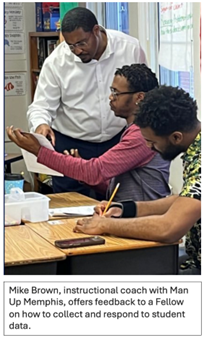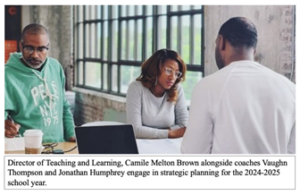07.08.24Advocacy Partnerships: Stories of Growth and Impact Part II

Our team’s extensive work in the education sector involves several advocacy partnerships—organizations we work with simply because we believe in their mission and purpose. One of the longest standing partnerships is with Man Up Memphis. In this blog post, Director of Advocacy and Partnerships, Brittany Hargrove, provides an update on what we’ve learned supporting their work in attracting and, more germanely, sustaining men of color in the teaching profession.
The education sector continues to face a significant challenge: between February 2020 and May 2022, the Wall Street Journal reported that more than 300,000 public school teachers and other education-related staff left their jobs citing heavy workloads, staff shortages, safety issues, low salaries, and burnout.
For the past few years, schools across the country facing staffing shortages and have worked to attract and retain exceptional educators, especially educators of color. Through our advocacy partnerships with Man Up Memphis, National Fellowship for Black and Latino Male Educators, and Teach Brother Teach, we’ve tried to study and better understand how schools were not only able to attract educators of color, but what support, including mentoring and training, is necessary for educators of color to thrive in their school communities.
One partner we’re excited to highlight for their outstanding support for new and novice male educators of color is Man Up Memphis. They are a shining example of what’s possible when male educators of color are provided opportunities to develop their capacity in a supportive and responsive school community. During the 2022-2023 school year, an impressive 92% of Man Up Memphis Fellows were retained in their roles. What’s driving this high retention rate? It’s the sense of connection and belonging that the Fellows experience. Dr. Patrick Washington, founder and CEO of Man Up Memphis, reflects on the transformation he has seen from Fellows, saying, “the belief system is changing in these guys. Brothers are walking different, moving different, winning again.”
 Man Up Memphis excels in fostering a supportive environment, especially for teachers and leaders new to their roles, that goes well-beyond achieving an increase in representation of educators of color in schools. Their programming is grounded in the belief that educators of color must be positioned to develop their knowledge and competencies so they can impact change and outcomes within the school communities they serve. Core to Man Up’s mission is the belief that every child must have access to an exceptional teacher and leader, and investing in educators of color must be part of that mission. Director of Teaching and Learning at Man Up Memphis, Camile Melton Brown and fellow coaches Jonathan Humphrey, Vaughn Thompson, and Mike Brown, play a crucial role in this success. With the support from Managing Director Sarah Isenhart and Director of External Partnerships, Nicole Lytle, they all ensure that Fellows feel celebrated and supported by maintaining regular communication, acknowledging their achievements, and being readily available for any needs. This approach has resulted in a strong sense of community and drive among the Fellows.
Man Up Memphis excels in fostering a supportive environment, especially for teachers and leaders new to their roles, that goes well-beyond achieving an increase in representation of educators of color in schools. Their programming is grounded in the belief that educators of color must be positioned to develop their knowledge and competencies so they can impact change and outcomes within the school communities they serve. Core to Man Up’s mission is the belief that every child must have access to an exceptional teacher and leader, and investing in educators of color must be part of that mission. Director of Teaching and Learning at Man Up Memphis, Camile Melton Brown and fellow coaches Jonathan Humphrey, Vaughn Thompson, and Mike Brown, play a crucial role in this success. With the support from Managing Director Sarah Isenhart and Director of External Partnerships, Nicole Lytle, they all ensure that Fellows feel celebrated and supported by maintaining regular communication, acknowledging their achievements, and being readily available for any needs. This approach has resulted in a strong sense of community and drive among the Fellows.
When we’ve interviewed and surveyed Man Up fellows on what conditions or factors made it likely they would remain within their school community, a few common themes emerged. First, fellows reported feeling most successful and likely to stay when they were provided consistent opportunities for professional learning, including ongoing PD and feedback, in core competencies that helped them impact student learning.
Second, many fellows, especially in their first year of teaching, highlighted a desire to learn and grow in an environment that felt safe, nurturing, and accountable. Teaching is hard and school leaders who made it safe to make mistakes in practice, encouraged fellows to ask for support, and remained consistent in their efforts to invest in their development via impactful professional learning, were more likely to retain their fellows.
And finally, many responses from fellows reminded us that we all have an inherent desire to belong to a group or community that values the assets we contribute to it. A sense of belonging, or feeling a deep connection to their work, colleagues, and the larger school community, was a primary factor cited for returning to their school communities. Fellows want to remain in school communities where they are valued, welcomed, and seen as an essential part of the community. The factors we’ve outlined above are key for increasing job satisfaction, and the likelihood educators of color will experience professional growth that best positions them to impact key performance indicators in their schools for years to come.
Actions Schools Can Take
Based on our learning from Man Up Memphis, here are some replicable actions schools can consider taking to build or enhance connection and belonging among their staff, thereby improving retention:
- Foster a Supportive Community: Create a culture where all staff feel celebrated and supported. Regularly acknowledge achievements, both big and small, and maintain open lines of communication. Use emails, newsletters, and meetings to highlight successes and milestones. This might take place publicly at a PLC or PD or perhaps goes out in weekly communication to your school team.
- Provide Professional Development Opportunities: Offer regular, meaningful professional development sessions, ensure these sessions address their real needs and challenges. Consider uplifting bright spots on your staff that are meeting and exceeding on the strategic priorities of your school.
- Promote Connection and Collaboration: Encourage collaboration among staff. Create opportunities for teachers to work together during school hours. Uplift the voices and best practices of staff you collaborate regularly.
- Ensure Accessibility of Leadership: Make sure school leaders are approachable and available. Being just a phone call or text away can make a significant difference in how supported staff feel.
- Address Workload and Mental Health: Take proactive steps to manage workloads and support the mental health of your staff. This could include hiring additional support staff, offering wellness programs, and creating a positive work environment.
By implementing these actions, schools can create a nurturing environment where educators feel connected, supported, and valued. This, in turn, will help retain dedicated and passionate educators, ensuring a brighter future for our students.
Sources:
Kathryn Dill, “School’s Out for Summer and Many Teachers Are Calling It Quits,” The Wall Street Journal, June 2022, https://www.wsj.com/articles/schools-out-for-summer-and-many-teachers-are-calling-it-quits-11655732689
Elizabeth D. Steiner, Ashley Woo, and Sy Doan, “Keeping Teachers of Color in the Classroom Will Take More Than a Pay Raise,” December 2022, https://www.rand.org/pubs/commentary/2022/12/keeping-teachers-of-color-in-the-classroom-will-take.html
